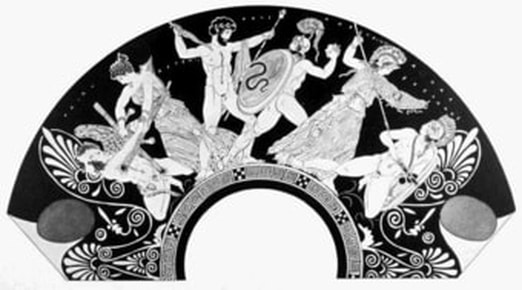PORPHYRION IN GREEK MYTHOLOGY
Porphyrion in Greek Mythology
Porphyrion was one of the strongest of the Gigantes spoken of in Greek mythology. Considered an equal of Alcyoneus amongst the ranks of the Gigantes, Pindar would refer to Porphyrion as “King of the Giants”.
The Gigante PorphyrionPorphyrion was one of the hundred Gigantes born to Gaia when the blood of the castrated Ouranos, spilt on to the earth. The same method of parentage was also often given for the Erinyes and the Meliae.
As the Gigantes were said to have been born on the Pallene (Phlegra), the westernmost peninsula of the Chalcidice, then this is presumably where the blood of Ouranos fell. |
|
Hyginus suggests that the Gigantes were the offspring of Nyx and Erebus, but this parentage was not widely copied in other ancient texts.
Porphyrion King of the Giants
The Gigantes are also commonly referred to as the Giants, although the word Giant does not directly equate to the modern usage, for the common trait of the Gigantes was their immense strength, rather than any great, or excessive, stature. One such demonstration of strength, is given when it was said that Porphyrion lifted up the island of Delos to throw at the gods.
Whilst some Gigantes were said to have some different physical features, including lion’s heads, most more simply thought of in terms of human form.
The only explicit characteristic given for Porphyrion was one of a tendency to excessive violence, a trait spoken of by Pindar, who was also the writer to give Porphyrion the title of “King of the Gigantes”.
Whilst some Gigantes were said to have some different physical features, including lion’s heads, most more simply thought of in terms of human form.
The only explicit characteristic given for Porphyrion was one of a tendency to excessive violence, a trait spoken of by Pindar, who was also the writer to give Porphyrion the title of “King of the Gigantes”.
Porphyrion and the Gigantomachy
The Gigantes are famous for the war they raged against Zeus and the other gods of Mount Olympus; a war referred to as the Gigantomachy. Various reasons are given for the uprising of the giants, but most commonly it was thought that Gaia roused her children to battle in response to the treatment of her other children, especially the Titans.
The Gigantes were troublesome by nature, and had little respect for the gods, so it was easy enough to rouse them to war.
In the ancient sources, the manner of Porphyrion’s death varies between writer, although, perhaps, as Porphyrion was the King of the Giants it took all antagonists to kill him.
The Gigantes were troublesome by nature, and had little respect for the gods, so it was easy enough to rouse them to war.
In the ancient sources, the manner of Porphyrion’s death varies between writer, although, perhaps, as Porphyrion was the King of the Giants it took all antagonists to kill him.
The Death of PorphyrionMost commonly it is said that Porphyrion died when he tried to attack Heracles and Hera; it might seem strange for Heracles and Hera to be fighting together, but a prophecy had been made that the gods could not win the war without Heracles fighting.
Anyway, as Porphyrion rushed at Heracles and Hera, Zeus caused the giant to become distracted, instilling with Porphyrion an overwhelming desire for Hera. So, as Porphyrion attempted to rape Hera, Heracles with his arrows, and Zeus, with his thunderbolt struck down the King of the Gigantes. This is the manner of Porphyrion’s death given in the Bibliotheca, though Pindar, states is was the arrows of Apollo who killed the Gigante, whilst Nonnus says it was ivy brought forth by Dionysus that entangled Porphyrion. The dispatched Gigantes were often said to be buried, and this then caused volcanos and earthquakes to occur, with it commonly said that Enceladus was buried under Mount Etna as an example, although no such burial is attested to for Porphyrion. |
|
|
|
Colin Quartermain - Porphyrion - 20th February 2020
